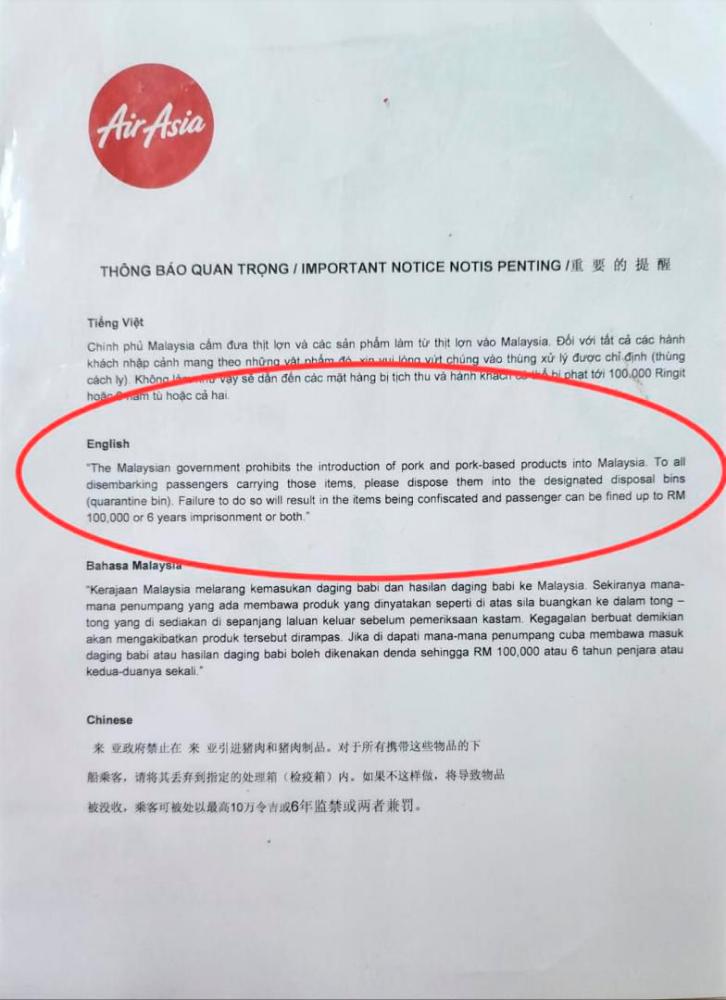PETALING JAYA: Malaysia continues to ban the import of pork and pork products from certain countries following the outbreak of African Swine Fever (ASF) in 2018.
The matter came to light again and has been widely shared on social media after AirAsia issued a notice to passengers saying they could be fined up to RM100,000 or be jailed for up to six years or both for breaching the ban.
Disembarking passengers carrying pork and pork-based products into Malaysia were told to dispose of them in designated disposal bins (quarantine bins).
An AirAsia corporate communications spokesman told theSun that the government imposed a temporary ban from September 2018 on pork and pork products from China, Macau, Hong Kong and Vietnam after ASF was detected in China in August of that year.
According to the World Organisation for Animal Health, ASF is a highly contagious viral disease affecting domestic and wild pigs, with a mortality rate that can reach 100%.
The virus is highly resistant and can survive on clothes, wheels, and in various pork products such as ham, sausages and bacon.
Consequently, human behaviour can significantly contribute to the spread of this disease across borders if adequate measures are not implemented.
Since August 2018, more than 10 countries have reported occurrences of ASF.
Lawyer Radin Amir Afifi Ahmad Aruani said the government’s instruction was originally issued through the Veterinary Services and Customs departments.
“It was done in line with the Malaysian Quarantine and Inspection Services Act 2011 (Act 728).
“The situation update in Asia and Pacific by the United Nations Food and Agriculture Organisation (FAO) shows that the outbreak was detected in Malaysia in October 2023,” he said.
In May 2024, the FAO reported that the first ASF outbreak was confirmed in February 2021 in Sabah, and the peninsula in December the same year.
In July 2023, ASF was detected in wild boars in Perak, followed by outbreaks on pig farms in Perak and Kedah in October the same year.
Radin Amir Afifi stressed the need to continue the ban due to health concerns and said there is no pressing need to lift it, as local production can sufficiently fulfil the demand for pork items without resorting to imports.
He said restrictions on the entry of foreign products such as pork from other countries are common and enforceable by any nation.
“For example, New Zealand imposes restrictions on the entry of certain products from abroad with the first line of defence being at airports to ensure the safety and health of its citizens and visitors from abroad.”
Rathena Paneerchelvan, 26, said the temporary ban on pork-based products entering Malaysia is justified due to the potential health hazards associated with ASF.
“Until the virus is eradicated, it’s important to maintain the ban for safety reasons. We don’t want another lockdown,” she said.
Robert Wong, 35, who was unaware of the ban, expressed concern about what he perceived as insufficient notification about it.
He said AirAsia’s notice seems to suggest a complete prohibition on pork-based products, which could be misconstrued as Malaysia enforcing such restrictions for religious reasons.
“AirAsia should provide a clearer explanation that the ban is temporary and aimed at preventing the spread of ASF. This will prevent misunderstandings that could negatively impact Malaysia’s image,” he said.









